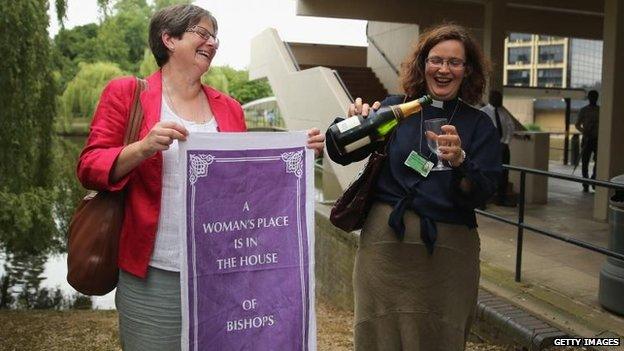Women bishops vote welcomed by Archbishop of Canterbury
- Published
- comments
Archbishop of Canterbury Justin Welby: "It was a theologically-based decision"
The Archbishop of Canterbury has welcomed the Church of England's historic vote to allow women to become bishops.
Justin Welby said he was "delighted" at the outcome, but acknowledged some within the Church would be "struggling" with it.
Some traditionalists remain opposed and could leave the Church as a result.
The ruling General Synod gave approval to legislation introducing the change by the required two-thirds majority.
'Hugely exciting'
A previous vote in 2012 was backed by the Houses of Bishops and Clergy but blocked by traditionalist lay members.
Archbishop Welby told BBC Newsnight the way the debate had been handled in recent months had marked a "major cultural change" in the way the Church worked, because people had been more willing to "talk to each other in a human way".
The decision was based on theology, rather than culture, he said.
"I am delighted personally that we are going to ordain women as bishops.
"That is something I have been looking forward to very very much and it's hugely exciting.
"But at the same time I am aware that there are a lot of people who are going to be struggling with this".
He spoke of the need to "hold everyone together" and to treat people as a family rather than as "party groups in which you chuck out the people you disagree with".
The crucial vote in the House of Laity went 152 in favour, 45 against, and there were five abstentions. In November 2012 the change was derailed by just six votes cast by the lay members.
The Revd Canon Nikki Arthy said she would welcome the appointment of a woman bishop in Gloucester
In the House of Bishops, 37 were in favour, two against, and there was one abstention. The House of Clergy voted 162 in favour, 25 against and there were four abstentions.
The result overturned centuries of tradition in a Church that has been deeply divided over the issue.
It comes more than 20 years after women were first allowed to become priests. More than one-in-five of priests in the Church are now female.
The motion will now go before Parliament's ecclesiastical committee, which examines measures from the Synod. The Synod would then meet again on 17 November to formally declare that women can be bishops.
Robert Pigott, the BBC's religious affairs correspondent, said a "substantial minority" of traditionalists from the Evangelical and "high church" wings did not want to serve under women bishops.
The leader of the Evangelical group Reform, Prebendary Rod Thomas, said there were likely to be a few traditionalist parishes who would either leave the Church or break relations with their bishops over the issue.
'Huge risk'
Meanwhile, Archbishop Welby also took issue with one of his predecessors, Lord Carey, over the issue of assisted dying.

There were celebrations outside the General Synod meeting at York University
Lord Carey, who was Archbishop of Canterbury from 1991 until 2002, has said he would support legislation that would make it legal for terminally-ill people in England and Wales to receive help to end their lives.
Archbishop Welby said Lord Carey was "absolutely entitled to speak" on the issue and had made the debate more high profile. But he warned of a "huge risk of manipulation" of an assisted dying law.
He added: "For what it's worth I think the way he has described compassion is written far too narrowly and with a lack of appreciation for the risks to people who would be put under pressure if the law changed, and that is why we are so against it".